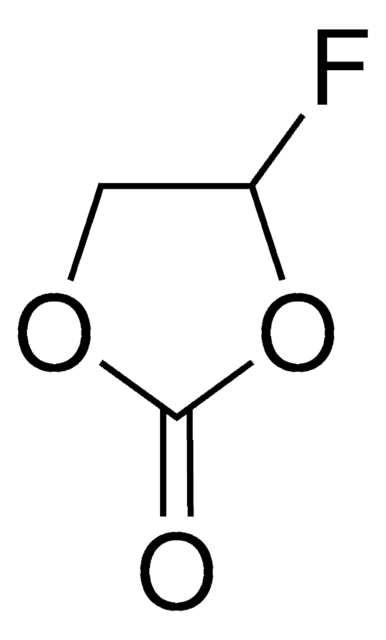733466
Acetonitrile
99.999% trace metals basis, electronic grade, battery grade
Synonym(s):
ACN, Cyanomethane, Ethyl nitrile, Methyl cyanide
About This Item
Recommended Products
product name
Acetonitrile, electronic grade, 99.999% trace metals basis
grade
battery grade
electronic grade
Quality Level
vapor density
1.41 (vs air)
vapor pressure
72.8 mmHg ( 20 °C)
assay
99.999% trace metals basis
form
liquid
autoignition temp.
973 °F
expl. lim.
16 %
impurities
≤0.05% water
water
color
colorless
refractive index
n20/D 1.344 (lit.)
bp
81-82 °C (lit.)
mp
−45 °C (lit.)
solubility
water: soluble (completely)
density
0.786 g/mL at 25 °C (lit.)
application(s)
battery manufacturing
format
neat
SMILES string
CC#N
InChI
1S/C2H3N/c1-2-3/h1H3
InChI key
WEVYAHXRMPXWCK-UHFFFAOYSA-N
Looking for similar products? Visit Product Comparison Guide
General description
Application
Related product
signalword
Danger
Hazard Classifications
Acute Tox. 4 Dermal - Acute Tox. 4 Inhalation - Acute Tox. 4 Oral - Eye Irrit. 2 - Flam. Liq. 2
Storage Class
3 - Flammable liquids
wgk_germany
WGK 2
flash_point_f
35.6 °F
flash_point_c
2 °C
Choose from one of the most recent versions:
Already Own This Product?
Find documentation for the products that you have recently purchased in the Document Library.
Customers Also Viewed
Articles
Dr. Schmuch, Dr. Siozios, Professor Dr. Winter, and Dr. Placke review the challenges and opportunities of nickelrich layered oxide cathode materials. They discuss production processes for the layered oxide cathode materials as well as their chemistry and morphology.
Lithium-ion batteries (LIBs) have been widely adopted as the most promising portable energy source in electronic devices because of their high working voltage, high energy density, and good cyclic performance.
The critical technical challenges associated with the commercialization of electric vehicle batteries include cost, performance, abuse tolerance, and lifespan.
Due to the adverse impact of the continued use of fossil fuels on the earth’s environment and climate, researchers have been asked to develop new approaches for producing power using renewable sources like wind and solar energy
Our team of scientists has experience in all areas of research including Life Science, Material Science, Chemical Synthesis, Chromatography, Analytical and many others.
Contact Technical Service








